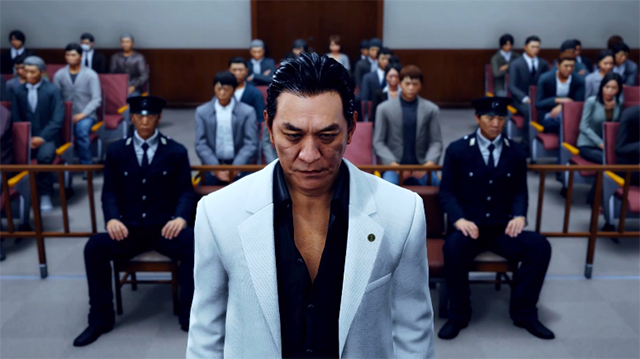One of the reasons why the Yakuza series has found a resurgence in popularity overseas is due to how it allows players to get a taste of authentic Japanese culture. From getting to explore the busy streets of Tokyo and go on dates with hostesses to being able to make friends at a Japanese bar in the small town of Onomichi, there’s no shortage of cultural entertainment to partake in. However, the situation currently surrounding the Yakuza spin-off title Judgment showcases the cultural differences between east and west better than any game ever could.
All of the drama stems from actor Pierre Taki being arrested for cocaine use, a crime that can put the 51-year-old behind bars for up to seven years. Since the arrest came to light, the Japanese version of Judgment, which was originally released in December 2018, has been pulled from store shelves by Sega and players can no longer buy the digital version from the PlayStation Store.
Going a step even further, the publisher began deleting tweets that advertised Judgment. There’s also uncertainty on the localized version of the action game, as the publisher hasn’t made a statement on if this will impact its scheduled June release date. On March 15, localization lead Scott Strichart posted a statement that he was also “waiting for answers” and will not tweet again until he has them “out of respect to everyone waiting.”
If you aren’t familiar with Japanese culture, it would be easy to dismiss this as a case of Sega being overly reactionary. However, it isn’t the only game developer that is making significant changes after the arrest of Taki. Square Enix announced that it will be recording all new dialogue for Kingdom Hearts 3 because Taki played Frozen‘s Olaf in the recently released action role-playing game. A single positive test for cocaine has led to one prominent publisher to pull a game entirely and another to replace an entire voice track via a mandatory update.
Drugs can end a career in Japan

The response to the news in North America has mostly been one of puzzlement. After all, we come from a world where it’s surprising when it comes out that a celebrity doesn’t do any drugs. From paparazzi photographs of notable figures being caught with paraphernalia to overdoses, drug use has become increasingly normalized within American culture. If anything, the use of illegal drugs has been glamorized by popular culture. After all, hitmakers like The Weeknd and Future aren’t exactly shying away from dangerous drug use in their music.
This isn’t the case at all in Japan. Forget about being caught with hard drugs, something as simple as marijuana use can be a career ender in the country. This has plagued many notable stars over the years. The late Norifumi “Kid” Yamamoto, who was an incredibly popular Japanese mixed martial artist, was dogged by allegations of going to “marijuana parties” with actors. While never arrested, the accusations were a public relations nightmare for the star. After a few years of his star dwindling in his native country, he wound up fighting in the west for the rest of his career.
This has also been a huge issue for entertainers trying to come into the country. Beatles guitarist Paul McCartney famously spent nine days in jail and was banned from the country in 1980 after they found half a pound of marijuana on him. Despite being one of the biggest stars in the world, he didn’t return to Japan, a lucrative stop for musicians, until 2015. In 2016, former WWE star Evan Bourne also spent several months detained in Japan after trying to sneak 2.12 grams of liquid marijuana into the country.
As you can see, Japan does not mess around when it comes to drug use. However, this isn’t merely about drugs. This is just one of the many cultural differences between the east and the west. Sexuality and marital affairs are also viewed quite differently. Famously, Japanese porn is censored to where genitals are blurred out. This may seem odd since Japan is filled with sexuality, from being able to purchase panties in vending machines and virtual reality masturbation booths becoming a popular destination, but it’s yet another example of the culture’s unique rules.
Extramarital affairs are another much more serious offense in Japan. Former WWF Light Heavyweight Champion Taka Michinoku voluntarily suspended himself for a year without pay from his own wrestling company after his affair came to light. Meanwhile, New Japan Pro-Wrestling star Taichi took a 30 percent pay cut and a two-month ban for the same transgression in 2014.
Games will never tell the full story of a culture

This entire situation is an important reminder that games can’t be used as a sole source for understanding another culture. Yes, there is a ton of value to the Yakuza titles providing an authentic look at Japanese life, but it’s still entertainment at the end of the day. You can’t learn everything about a culture and its varied practices by just taking in its various forms of media. It’s a great launching off point, and a great way to learn about many aspects of their culture, but it should just be the first step. Only by actually reading up on a country, talking to people who live there, and visiting it yourself, can one start to begin to understand the deeper layers of cultural differences.
Regardless of how one feels about the current situation, it’s important to remember that cultures do not change overnight. It took decades of acceptable drug use to get the United States to where it currently stands today, and it took decades of criminalized drug use to get Japan to its current stance. These aspects are ingrained in people’s upbringing and Judgment‘s current state of uncertainty is nothing more than a side-effect of a greater cultural difference.







